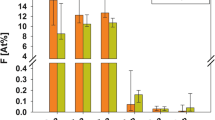Abstract
IN one of the first observations made with the aid of the microscope, Leeuwenhoek1,2 found that he could detect fewer organisms in scrapings taken from teeth after drinking hot fluids than in scrapings taken before the drink. Although many investigations have been made into the physical effect of thermal changes upon enamel and into the effects of conducted heat upon the dental pulp, there is no evidence in the literature of Leeuwenhoek's observation having been pursued.
This is a preview of subscription content, access via your institution
Access options
Subscribe to this journal
Receive 51 print issues and online access
$199.00 per year
only $3.90 per issue
Buy this article
- Purchase on Springer Link
- Instant access to full article PDF
Prices may be subject to local taxes which are calculated during checkout
Similar content being viewed by others
References
Leeuwenhoek, Select. works, Trans. Hoole, 118 (London, 1800).
Dobell, “Leeuwenhoek”, 286–55 (John Bale, Sons and Danielson, London, 1932).
Soyenkoff and Okun, J. Soc. Dent. Res. (June 1956).
Phillips, Johnson and Phillips, J. Amer. Dent. Assoc., 53, 577 (1956).
Author information
Authors and Affiliations
Rights and permissions
About this article
Cite this article
ROTHWELL, P. Investigations into Temperature Changes on the Surface of Human Tooth Enamel. Nature 181, 1805–1806 (1958). https://doi.org/10.1038/1811805a0
Issue Date:
DOI: https://doi.org/10.1038/1811805a0
Comments
By submitting a comment you agree to abide by our Terms and Community Guidelines. If you find something abusive or that does not comply with our terms or guidelines please flag it as inappropriate.



